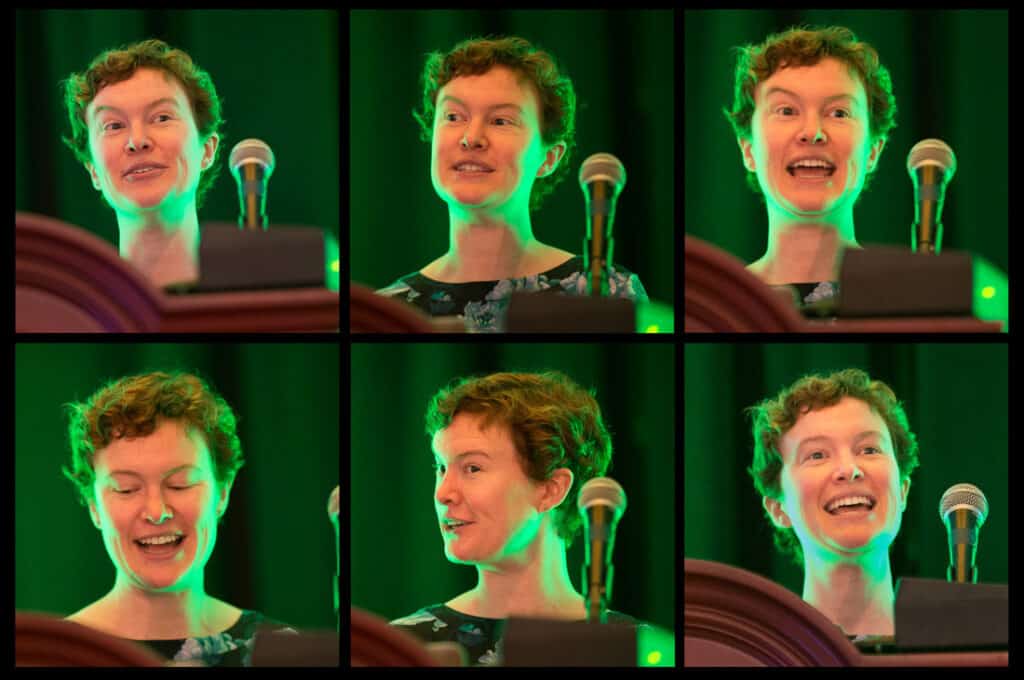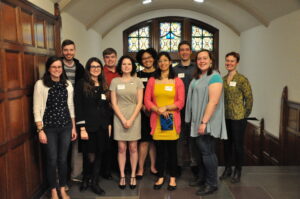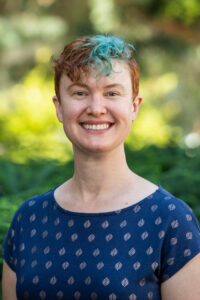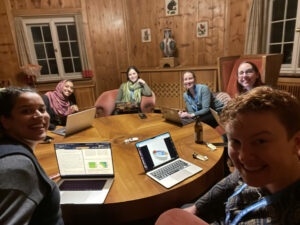Emily Rauscher Talks Exoplanet Weather

Growing up in Berkeley, California, Emily Rauscher delved into different worlds through books, movies, and games. “I was a gamer kid,” she says. Her favorite was a role-playing game called Call of Cthulhu, set in a fantasy world with powerful supernatural beings. “You stumble upon an object; you read a book you shouldn’t have; you learn secrets you shouldn’t have learned,” she says.
Now, an astronomer at the University of Michigan, Rauscher uncovers the rules to other new worlds: exoplanets, or planets outside our solar system. Rauscher uses observational data and numerical models to study these planets’ atmospheres. Her research largely focuses on hot Jupiters, a category of planets that are the size of Jupiter but ten times closer to their star than Mercury is to the Sun. “These planets are big and bright, so they’re the best targets for observations,” she says.
Rauscher is using NASA’s JWST, a space telescope launched in 2021, to map three-dimensional details of these exoplanets’ atmospheres. (Editor’s note: Some astronomers, including Rauscher, refer to the telescope exclusively as its acronym JWST. See, e.g., this article.) She spoke to 1400 Degrees about her career studying hot Jupiters and her thoughts on the culture of the field.

What do you study?
I make three-dimensional simulations of exoplanet atmospheres. Given physical properties of a planet, I calculate its temperature and wind patterns. From this, I figure out what physical processes influence the atmosphere. I also try to predict how properties of the atmosphere show up in observations.
Do you have a favorite exoplanet?
My favorite exoplanet is a hot Jupiter called HD 189733b. It orbits a bright star about 65 light years away. It’s the first planet whose day side we’ve mapped two-dimensionally. This means we have information about its temperature structure and planet wind speeds for one layer of the atmosphere. Two teams of scientists independently used data from the Spitzer Space Telescope to make this map using eclipse mapping, where you characterize the planet by measuring the loss in light as the planet moves out of view behind the star. I love eclipse mapping because it’s the technique that got me into exoplanets.
How do you tell if a planet has an atmosphere to begin with?
We observe light from the exoplanet’s star and measure the brightness of its wavelengths, or colors, known as its spectrum. When the planet is transiting—passing between us and its star—the planet blocks some light from the star. The light dims, and that’s a main method for detecting planets. If the planet also has an atmosphere, it will absorb some starlight at specific wavelengths based on the molecules in the atmosphere. We know a planet has an atmosphere when we see this extra absorption in the star’s spectrum when the planet is transiting, compared to when the planet is not in transit.
You were part of a team that discovered a new way to infer the presence of wind on planets. Can you explain the technique?

In this technique, you measure the spectra from the exoplanet and its star. Motion causes the spectra to shift in wavelength, similar to how the pitch of a sound wave changes as a firetruck drives by. In addition to observing shifts due to the planet’s orbit around the star, we made models that showed spectral shifts due to atmospheric motion, or wind. I worked with my now-longtime collaborator, Eliza Kempton, to publish our first paper on this in 2012. It was one of the first projects I did independently of my PhD advisor, which is an important part of growing up as a scientist.
The technique is actually quite complicated because the planet’s spectrum is so faint—fainter than the noise on the star spectrum. In 2010, another team figured out you can extract the planet’s spectrum by matching the observed lines to a template spectrum. This is a model of a spectrum that you simulate if you know the atmosphere’s main temperature and its main molecules. It works because spectral lines are very precise.
This team found that even when they accounted for the planet’s orbital motion, the spectrum was still shifted. The wavelengths were slightly shorter. The errors were too large to say the shift was a real signal, but you could interpret the shift as winds on the planet that blow from the planet’s hot day side to its cool night side, which faces us. This inspired our work.
The field of exoplanets experienced a public scandal when Geoff Marcy was found to have sexually harassed several of his students. He played a part in your early career, as you did your undergrad senior thesis and published your first paper with him. How do you reflect on that time?
It’s complicated. After his behavior came to light, it’s eerie to have been so close to that situation. I never felt unsafe around him, but I have no doubt that he did what people have talked about. When I was in college, all the undergrads knew that he treated the female students differently than the male students. I feel like I dodged a bullet. At the same time, he helped my career. He gave me advice and wrote me recommendation letters. His public advocacy of women in science gave cover for his harmful behavior, and I feel conflicted about his support in my early career.
The reaction from the community was also interesting to watch. Many men in astronomy were surprised, while women weren’t. People who had experienced harassment also reacted differently from those who had not. Some people wanted to see all the evidence so they could evaluate the accusations themselves. It was a scientist way to react, but completely neglects the fact that these are people’s personal lives, not data points for public display.
The scandal predated the #MeToo movement, which meant society had less communal recognition about trusting these stories. I’m hopeful that more people are willing to speak up about cultural problems in the field, and more people are willing to listen.
Are there any difficult conversations that you would like the community to have?

The problems are nuanced, but conversations should center on the structure of academia. We need to change the system to prevent harming people in the first place. For example, academia prioritizes hiring people mainly on their research productivity: the papers you publish, the impact of those papers, the talks you give. It makes sense on one level. As scientists, we want research to be our main endeavor. But you could be a horrible human being or a bad mentor to students, and the system wouldn’t penalize you. If we want to be responsible human beings, the job description should require a willingness to work on these issues.
Have you had any personal challenges in academia?
I’m Christian. Earlier in my career, being religious sometimes felt scary to reveal. I’m aware that Christianity is the dominant religion in the US, and Christianity specifically has actively harmed people here. I’m not saying that I’m under attack. But in my experience conversing with scientists, some deride religion. The assumption can be that everybody in the room is atheist, and religious people are deluded. That wasn’t fun, as my religion is important to me. I see no conflict between my faith and my science.
In your Twitter bio, you wrote “cares about humans more than science.” What does that mean to you?
I love science, but I do not want to be doing it at the expense of other people. Science, like art, is creative and can be very personal. But it’s not what I think is most important in life. It’s a reminder to not to get lost in my work.
Sophia Chen is a science writer who covers physics, space, and anything involving numbers. Find more of her work at sophurky.com.
Want to recommend a physicist for us to profile? Write to info@1400degrees.org. All interviews are edited for brevity and clarity.
